|
As the top search engine in the world, Google drives more traffic than any single source, responsible for about 75% of all search queries in the U.S. today - including when consumers look for a local Realtor, mortgage lender, or any business. Google has been around almost as long as there's been an Internet, but it has a relatively new platform that can do some pretty incredible things when it comes to expanding your reach and presence online. (We're not talking about Google+, which is dead as disco!) I’m referring to the Google My Business page feature on – you guessed it – Google. As a real estate agent, getting your NAP (name, address, phone numbers, etc.) as well as brokerage name, the area you serve, email address, and website, etc. are crucial, and Google My Business will help you do that – and way more. And the best part is that very few Realtors and loan officers are bothering to use it yet, so you have a window to be ahead of your competition. In fact, having (and using) a Google My Business listing can:
The best part is that it’s free! However, it does take a little bit of time and know-how to do it correctly (you don't want to just use your home address, but set up your business as a solo practitioner at your brokerage address, etc.) so contact me if you need helping setting it up quickly and inexpensively. Ok, let’s dig into the features and benefits of Google My Business: What is Google My Business? Google My Business is a convenient tool for businesses, organizations, and even real estate agents to organize, catalog, and promote their online presence across the Google universe. That includes syncing Google search, Google Maps, and more. You can find the portal to get started at Google.com/business. The powerful benefits of Google My Business: By setting up and using Google My Business correctly, you’ll make it far easier for potential clients to find you, forums to connect with them directly, and ways to measure and optimize those interactions. 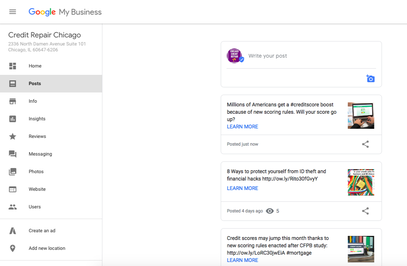 One of the main benefits, of course, is that your business will show up right when people are searching for your services or similar business in your area. For Realtors, that may mean that when people search Google for "Real estate agents in East Sacramento" or "Buy a home in San Jose,” your business will appear in the search, complete with all the information you want them to have right at their fingertips – your name, phone number, website, email and even a flag on the Google Map. Amazing! Since a Realtor's business is hyper-local (you don't care about showing up for home sale searches in Kansas, or even Los Angeles, if you're a real estate agent in Sacramento), Google's Google My Business (let’s call it GMB to save my typing finger) is a powerful and focused tool – and one that gives you a competitive edge over the 98% of other real estate salespeople who aren't using it. 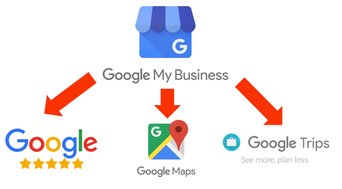 Here is some information that GMB will document and share across all Google platforms: • Phone number • Website URL • URL to make an appointment • Business hours • Address (Again, this can be tricky for Realtors, but there's a correct way to do it.) • Locations • Categories • Company Logo • Profile Photo • Internal and external photos • Virtual Tour (if applicable) • Videos • Other social media links All of these tools will be at your disposal – and more with their advanced function. It's no wonder why an estimated 39% of local retailers and walk-in businesses have already claimed and verified their Google My Business listing. Do you need more convincing? In part two of this blog, we’ll bring you information about these 10 benefits of having a Google My Business page: 1. Your Google listing will attract a new audience via Google Search. 2. Your business will pop right up in Google Maps. 3. Easily manage your business information. 4. Gain reviews - and answer them directly. 5. Write and share Google posts. 6. Access user insights and search analytics. 7. Get a free Google website! 8. Offer specials, promotions, special discounts, etc. 9. Enjoy their Question & Answer feature. 10. Direct message your audience and potential clients. Tune in for part two coming soon, or email me if you'd like help setting up your Google My Business listing.
3 Comments
Real estate agents and mortgage loan officers do a whole lot of marketing, but there is no better use of their time and resources than producing short and simple videos.
We’ve covered the research behind this before, but here’s a compelling summary: 85% of home buyers and sellers admit that they want to work with a real estate agent who uses video. Homes for sale that have video marketing have 400% more views and inquiries than homes without any video. 86% of potential home buyers are using video to research communities, and 70% use it to view inside of a home. But, here’s the rub: we’ve known (for years!) that video is KING when it comes to social media. However, most Realtors and loan officers still are using it reluctantly – or not at all. And I totally understand that because it’s intimidating to get in front of the camera and “act natural.” I’ve found that if you have a carefully planned, focused and specific topic that’s offering a lot of value to your audience, it’s much easier to turn on the camera and just let your passion and expertise take over. So, here are 100 video topics for Realtors (and many of these will work for mortgage lenders, too) can shoot and share for their social media marketing: 1. Community videos (Introducing and covering general information about different neighborhoods and communities). 2. Listing house tours (of course!). 3. Architectural tours (talking briefly/showing one kind of architecture with a few local examples). 4. Listing presentation – have a short video to send to your potential clients ahead of the listing presentation. 5. FAQs for listing your home – convenient to send to new clients and have on your website/social media. 6. FAQs for buyers – same thing. 7. Special FAQs for first-time buyers (first-time buyers needs extra education and TLC!). 8. Monthly market updates. 9. What IS included with a typical home sale? 10. What ISN’T included with a typical home sale (but maybe negotiable). 11. About the loan/mortgage process (bring your lender into this one!). 12. About title and escrow and the process (same as above but with title and escrow staff). 13. Breaking down property taxes. 14. About your home inspection (including bringing in your favorite inspector for a cameo). 15. About pest inspections (same). 16. Answer a single question from your clients or audience – maybe even live! 17. Preparing first-time buyers for the stress, uncertainty, and fear they might experience. 18. Getting ready to buy with a mortgage lender (preapproval, etc.). 19. The benefits (and high Return on Investment) of home staging. 20. Fixing up a home to sell (including your contractor). 21. Fixing up a home once you buy it with tile, paint carpet, fixtures, and other cosmetic fixes. 22. About roofs, repairing or replacing roofs, roof certifications, etc. 23. Talking about the appraisal process with your favorite appraiser. 24. Revealing real estate agent secrets. 25. How to choose a good lender (what to look for, questions to ask, avoiding big internet companies, etc.) 26. How to choose a good listing agent (you!). 27. What to look for in a buyer’s agent (you again!). 28. What to do in a bidding war (for buyers). 29. How to create buzz that might result in a bidding war (for sellers). 30. How to get more for the sale of your home. 31. Negotiation tips, strategies, and tactics. 32. What goes into a purchase offer other than just price. 33. Breaking down and explaining a purchase agreement. 34. TESTIMONIALS! 35. Cover community events, local fairs, festivals, fun runs, etc. 36. Profile local businesses. 37. Interview local politicians. 38. Interview local school principals (although you can’t give school system ratings or rankings as a Realtor, so be careful with this one!). 39. Cover new restaurant openings or just give a shout-out to your favorite neighborhood restaurants/bars, etc. 40. If you lived in this neighborhood, THESE would be your local amenities…series. 41. Summarize all of your written blog posts. 42. Funniest things you’ve seen as an agent. 43. Home security does and don'ts (with an alarm company). 44. Why you DON’T want a discounted agent or a low-cost real estate brokerage. 45. Don’t be ZILLOW’D! 46. Covering the details of a Comparative Market Analysis, and how it helps determine a fair and accurate home price. 47. Youth sports and athletics in your neighborhood/community/city. 48. Yoga in your neighborhood/community/city. 49. The best gyms in your neighborhood/community/city. 50. Best coffee shops in your neighborhood/community/city (very important!) 51. Best ice cream shops in your neighborhood/community/city. 52. Parks and recreation areas in your neighborhood/community/city. 53. Common buyer mistakes to avoid. 54. Common seller mistakes to avoid. 55. Local holiday themes (Christmas, Halloween, Valentine’s Day, etc.). 56. Awesome house amenities, appliances, new tech innovations, etc. 57. Covering one specific amenity like floor tile, countertop surfaces, fixture metals, etc. 58. All about swimming pools and real estate (prices, liability, renting with a pool, impact on sales price, etc.). 59. Homeowner liability. 60. Homeowner insurance (you can do several videos with your insurance agent!). 61. Interview a policeman about crime and safety in a specific community (but Realtors CAN'T give their own information about crime statistics and levels, just refer to a third-party source). 62. Common neighbor nuisances, disturbances, and issues (and who’s right?). 63. A day in the life of a Realtor or mortgage loan officer (you!). 64. All about HOAs. 65. Are condominiums really a good deal? 66. What to look for – and what to avoid – when buying a condo. 67. Rent versus buy broken down. 68. Radon safety. 69. CO2 detectors and safety. 70. Fire safety in the home, including the cause of most home fires and how to prevent them. 71. What buyers or sellers need to know about unpermitted upgrades, rooms, or structures. 72. Inside a real estate closing/document signing. 73. When is the best time to sell your home? 74. When is the best time to buy a home? 75. Septic tanks, sewers, and common plumbing problems. 76. All about closing costs – and who pays them? 77. About your company. 78. Why you love selling real estate. 79. About you, both personally as an agent. 80. Design trends, paint colors that are “in,” etc. 81. How to spruce up your curb appeal. 82. Landscaping tips. 83. Painting tips. 84. Energy saving/going green tips. 85. Money saving tips. 86. Cool and fun around the house hacks. 87. Is it a buyer’s or seller’s market? 88. Special offer, raffle, giveaway, etc. 89. New home buyers jumping for joy! 90. History of your community/neighborhood/city. 91. Great things to do in the summer in your area. 92. Or, great things to do in each season. 93. Or, even a weekly “What to Do in _______ (city name) This Week” series. 94. Video scavenger hunt/neighborhood/city trivia contest. 95. Profile of the area’s pro sports teams. 96. Buyer/seller regrets (and how to avoid them). 97. Investing in rental units. 98. Buying multi-family or multi-unit real estate. 99. Whiteboard instructional videos (there are some great services that can make these for you if you send them the written bullet points). 100. A breakdown of why home ownership is still the best way to build wealth – and the American Dream! Can you commit to doing all of these over the next year? (That's about one every three+ days). Or, maybe highlight the ten you like most and schedule them for next month to get started. Either way, you'll see the results with your marketing and client engagement almost immediately! Contact me if you need help or want to talk strategy! -Norm :-) 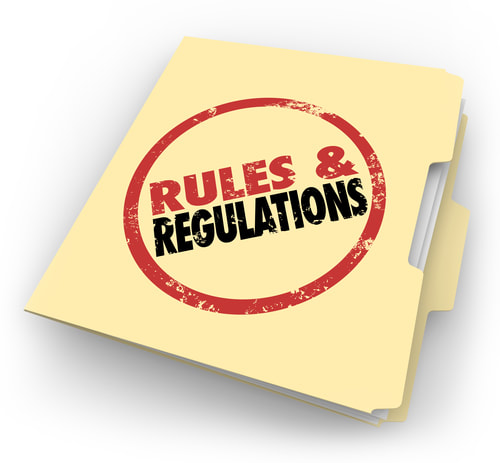 As a Realtor, half of your day is probably consumed with tasks related to your service, such as showing homes, writing offers, checking on the progress of escrows, and making sure the For Sale sign has gone up in the front yard. However, the other half of any Realtor’s day is most likely taken up with marketing. Like no other profession I can think of, real estate sales professionals spend the lion’s share of their time, energy, and budget on growing their personal brand and acquiring their own new clients. The competition to work with new home buyers or sellers is also fierce in most markets across the country, as each Realtor is competing with hundreds – or even thousands – of their peers at any given time. Therefore, marketing never sleeps, and getting creative with your advertising to stand out from the pack is paramount. We’ve seen it all, as Realtors try some whacky, wild, and sometimes genius ads to get attention and earn at-bats with prospects. However, sometimes it can go too far. In fact, there are some very strict rules, guidelines, and even laws that dictate what real estate professionals CAN and CAN’T do when it comes to their advertising. The rules also change periodically, as there were new updates to the California rules for Realtor advertising effective January 1, 2018. Today, we’ll bring you a quick guide to cover just that. Per the California Association of Realtors: Beginning January 1, 2018, all first point of contact solicitation materials must include: • The name and number of the licensee. This is for both sales-agents and broker-associates. • The responsible broker’s “identity.” This means the name under which the broker is currently licensed by CalBRE and conducts business in general or is a substantial division of the real estate firm. The broker’s license number is optional. • The status of the agent such as “REALTOR®” or “agent” (unless the name of the company makes clear that the advertisement is by a licensee) What types of advertising does this apply to? Everything. That includes: • Business cards • Stationery • Advertising flyers • Advertisements on television, in print, or electronic media • “For sale,” “open house,” lease, rent or directional signs when any licensee identification information is included • Any other material designed to solicit the creation of a professional relationship between the licensee and a consumer Are there any exceptions? There is a limited exception.
 Do you have a Facebook page for your real estate business or brand? If you're smart and serious about selling real estate, you do, as the world’s leading social media platform is a powerful tool for any Realtor to connect and communicate with their audience. In fact, there are now an average of 1.28 billion active users every day on Facebook, and 1.94 billion monthly active users. But more than just posting vacation selfies and revealing our relationship status, Facebook has grown into one of the biggest drivers of consumer traffic in large part thanks to Facebook reviews. In fact, Facebook recently surpassed Google as the top source of search traffic, a monumental shift in the search query paradigm. Facebook’s rating system – that series of stars with the corresponding numeric rating that accompany many Facebook business pages - is an integral part of how we find, use, and perceive companies these days; including Realtors. In fact, about 66 percent of all consumers will leave a review for a recent purchase, service, or visit. And the majority of consumers read up to six online reviews before forming an opinion whether they’ll patronize that business or not. Therefore, savvy sales professionals are focusing their attention and even resources on their reviews and star rating on Facebook as a means to connect and interact with home buyers and sellers. How do Facebook reviews work? To drastically simplify, more positive reviews = better ranking = higher visibility = more new customers and clients. Now, a little more in-depth. Just like Google has its complex system of ranking search queries (including businesses) based on 200 independent factors, Facebook uses its own proprietary algorithm called EdgeRank. You don’t really need to worry about the particulars of EdgeRank like Affinity, Weight, Time Decay, but just know that the more reviews you have and the better your star rating, the more visible your business will be on Facebook users’ newsfeeds, as well as show up on specific searches. Do Facebook reviews matter that much? Garnering more positive reviews absolutely will make a significant impact on your business’ growth and customer acquisition, according to multiple studies. For instance, the Social Recommendations Index found that 71 percent of Facebook users trust the content that they see on there, including reviews. And Forbes magazine reported that 88 percent of consumers perceive online reviews as trustworthy. Furthermore, Facebook reviews left by your Facebook friends, friends of friends, or those in your same community, hold additional weight and influence over consumer purchase decisions. Here are some of the other benefits of Facebook reviews: • Direct and immediate communication with your audience • Gain invaluable feedback and learn the “buzz” about your brand • They are free! • Establish credibility • Transparency (you can see who is writing these reviews, establish who they are, and even contact them) • Can respond or react in a public forum • Increase EdgeRank and visibility • Foster trust • Opportunity to turn negative or neutral perceptions into positive experiences • Identify potential brand advocates • Improve web traffic • Demonstrate social proof The importance of social proof Let’s pause and talk about that last one, for a moment. Demonstrating social proof is paramount for businesses these days, as it has become a typical prerequisite to the decision-making and purchase cycle. Various studies found that: • 90 percent of all customers surveyed say that their decisions to buy a product or service are influenced by online reviews, • 85 percent of all online shoppers read reviews before making a purchase, and • 88 percent of consumers trust online reviews just as much as personal recommendations. How to get more Facebook reviews: • Ask your buyers or sellers to leave a Facebook review immediately upon using your service or patronizing your business. (Remember that you can even ask people for a great review if you just gave them a CMA or answered their questions!) • Include the link where they can leave a Facebook review whenever possible – both in print and an active digital link. • Share this link across different platforms, like on your website, email signature, and even other social media posts and profiles. • Share (and celebrate!) those great Facebook reviews. Glowing customer opinions constitute the best free marketing you’ll ever get! • Email your database a request to gain more reviews. • Run a promotion that fosters reviews. This is a FANTASTIC way to create more interest and gain exposure. Rules and regulations governing reviews But before you start planning your next campaign to earn 100 new Facebook reviews, you should be aware that there are some things that you can’t do for reviews. For instance, per Facebook guidelines, you can run a promotion or giveaway with the requirement that someone leaves a review as their entry, but you can’t request that they share that review (or anything else) on their personal page, and you definitely can’t filter for only good reviews. Most people don’t realize that they can also end up in serious trouble with the Federal Trade Commission (FTC) for mismanaging reviews, too. The FTC set forth their guidelines for Truth in Advertising in 2009, including a mandate that any company must disclose if they're compensating people for online testimonials, endorsements, or reviews. Over the last decade, a long list of companies have been flagged and fined by the FTC for violations, including some that were offering discounts, prizes, and other incentives in exchange for reviews – a big no-no. If your company or brand is planning on making a big push for new reviews, it’s worth reviewing Facebook’s guidelines as well as the FTC regulations in detail. *** We’ll bring you part two of this series on Facebook reviews very soon, with tips and best practices for responding to positive, neutral, and (especially) negative Facebook reviews from customers. Need help with your real estate and mortgage marketing? We can help! 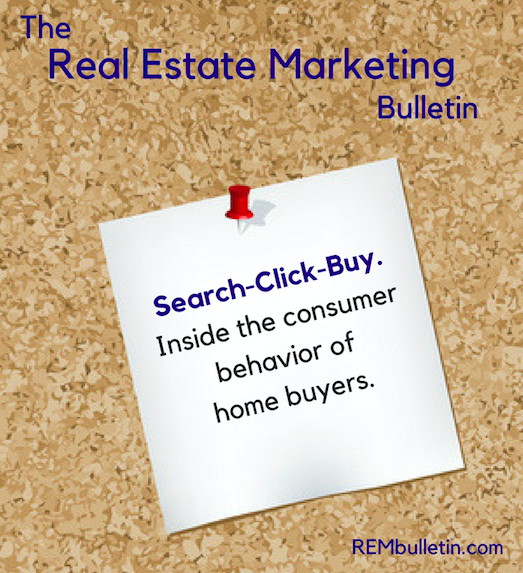 Search-click-buy. Inside the consumer behavior of home buyers. Are you the best real estate agent in the world? I bet you are, but if no one else knows about it, you’re still not going to have much business. In fact, marketing is a critical part of any Realtor’s job description, and yet one that is sometimes conducted in an unfocused and haphazard fashion. Today, we’re going to talk about the stats, facts, and data for home buying and selling consumers. I hope this will help you Realtors get more listings, work with more homebuyers, and have the best year of your career! Let’s start with a depressing fact about consumers and their real estate agents: Did you know that 70% of all homebuyers forget their real estate agent after just one year? How are homebuyers searching for homes? BY now, you know that the answer is “The Internet.” In fact, 80% of all buyers are searching for their next home online. Consumers aren’t only searching for their next home on the Internet – they’re finding them! In fact, 56% of buyers age 36 or younger found the home they purchased on the Internet, while 50% of buyers ages 37 to 51 years did the same. In total, 44% of current homebuyers purchased a home they found with the help of the Internet. Our shifting technological trends don’t only mean we’re going online to find homes, but that we’re going online on our mobile devices to do so. In fact, 58% of Millennials, 46% Generation X, and 33% of Younger Boomers found their home on a mobile device. Currently, the typical homebuyer uses their mobile device to search for homes on websites, scroll through photos of For Sale homes, pull up more information about properties, and even request more information from an agent. 83% of all home buyers want to see pictures of the property online, and video tours perform even better. After finding a home on the Internet, consumers took these actions: 45% Walked through a home they viewed online 29% Located a real estate agent through that online home sear 21% Dropped by or drove by the home to see it in person. Since the Generation Y accounts for 68% of all first time home buyers, Realtors need to make sure that their online marketing is up to speed, including being optimized for mobile use. In fact, 80% of all social media activity will occur on a mobile device in 2018! Your future clients are looking on their smartphones and mobile devices not only to search real estate websites and check emails, but to look up real estate information on social media. To fill that consumer need, 91% of Realtors are currently using social media to some extent. However, there is far too much blurring of business and personal on social media for real estate agents, as only 30% have dedicated social media accounts that are active. Only 43% of real estate agents use social media for prospecting, and only 64% – or two out of every three – use social media for marketing. Even more alarming, only 9% of Realtors are now using social media to market their listings! But before you go to build a new business Facebook page and start posting tons of content, you have to be discerning with what you post (and when and why) to really make an impact with consumers. About one out of every two Facebook users never visit a real estate agent or company’s page after first “liking” it. 43% of people who unlike or unfollow a real estate professional’s page do so because of too much overt advertising and sales messages. In fact, the real estate industry ranks lowest in social media engagement of any major industry, with an average of only 0.45 interactions per week on social media. Can you use some of this data about consumers to shift your online marketing and attract new prospects? Contact us to find out how! |
Categories
All
Archives
December 2020
|
Get in touch: |

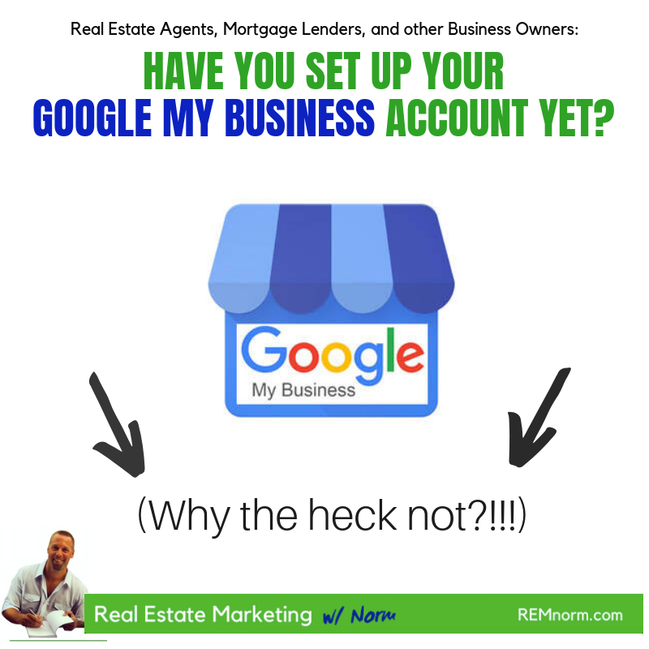


 RSS Feed
RSS Feed
